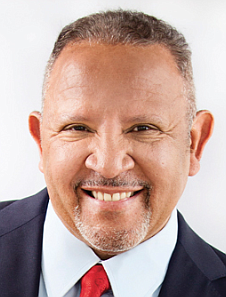Federal overreach seeks to undermine the success of America’s Black mayors, by Marc H. Morial
8/21/2025, 6 p.m.

“The status quo has failed. We cannot police our way out of crime. We have to invest in people, prevention, and healing.”
— Baltimore Mayor Brandon Scott
American cities reflect the soul of the nation. From their skylines and cultural institutions to their small businesses and neighborhoods, cities are where American identity is built, tested and tr ansformed. They are global symbols of innovation, diversity and resilience, and their leadership is central to the nation’s future.
For generations, Black mayors have shaped that future by fighting for equity, accountability and justice. Their leadership has centered marginalized communities and expanded access to opportunity. Today, that legacy is as vital as ever.
This past week, misleading statements from national leadership describing the District of Columbia as overtaken by “violent gangs,” “roving mobs of wild youth” and “drugged-out maniacs” evoked a familiar and troubling pattern. Once again, fear-based narratives are being used to justify federal overreach and to undermine local governance, particularly in cities led by Black mayors. These attacks are not only factually inaccurate, but also politically motivated, racially coded and historically rooted.
Across the country, Black mayors are demonstrating that community-based leadership is effective and transformative. The work of mayors past and present illustrates a sustained commitment to justice, even in the face of systemic barriers and public criticism.
In the 1970s, Detroit Mayor Coleman Young eliminated the city’s notoriously violent STRESS unit and implemented one of the earliest models of community policing. He understood that policing without accountability erodes public trust.
In New Orleans, Marc Morial’s father, Ernest “Dutch” Morial, fought to integrate city departments and create more equitable access to public services. As the city’s first Black mayor, he laid a foundation for representative governance at the local level.
During Marc Morial’s own two terms as New Orleans mayor, investments in innovative youth programs and a commitment to police accountability slashed the rate of violent crime in half and transformed a corrupt law enforcement agency into a national model.
Washington, D.C., Mayor Marion Barry expanded youth employment and education programs, launching the city’s first summer jobs initiative and establishing a precedent for municipal investment in young people.
Today, that legacy continues.
Baltimore Mayor Brandon Scott’s Group Violence Reduction Strategy, grounded in community engagement and public health, has contributed to the lowest homicide levels the city has seen in more than 30 years. In Chicago, Mayor Brandon Johnson has prioritized early childhood education, youth employment and mental health access, alongside a measurable decline in gun violence. Mayor Karen Bass in Los Angeles is advancing housing-first strategies to address homelessness and has pushed back against federal attempts to criminalize urban poverty, including the attempted ICE takeovers in June.
These leaders and many others are governing with urgency, guided by data and driven by the needs of their communities. They are not only responding to crises, they are reshaping systems.
This is not new. Black mayors have long served as a moral compass in American cities, advocating for marginalized populations, resisting federal overreach and creating innovative local policies rooted in justice.
The challenges cities face, from public safety to housing, from education to economic inclusion, demand comprehensive solutions and collaborative leadership. What they do not need are politically charged narratives that undermine progress and demonize communities.
To be equal, America must trust the leadership of its cities. It must invest in their success. And it must recognize the historic and ongoing contributions of Black mayors who have turned local governance into a platform for transformative change.
Their legacy is not one of chaos. It is one of courage, care and commitment to what is right.
The writer is a former mayor of New Orleans and president






